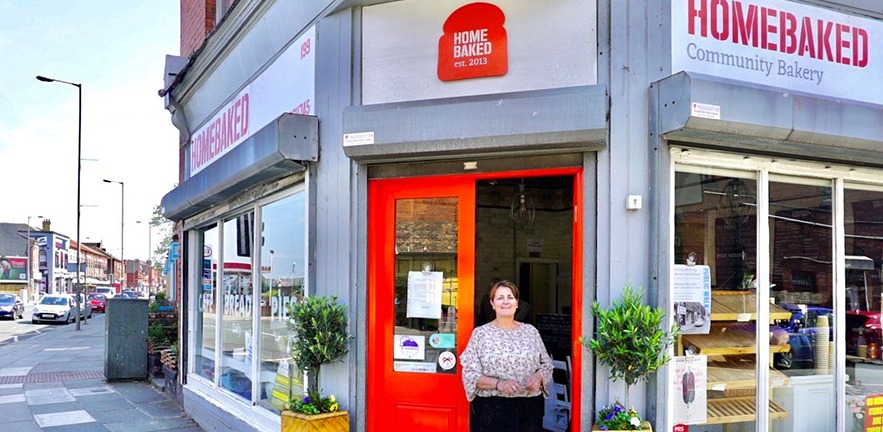Overview
Homebaked Bakery, a thriving community-owned business with an international reputation, showcases how community-rooted businesses can regenerate the UK’s left-behind high streets.
A co-operative bakery located opposite Liverpool FC’s iconic Anfield stadium, Homebaked is famous across Merseyside and beyond for its award-winning pies. Having taken over the local neighbourhood bakery to save it from demolition, the co-operative has grown to become a thriving business and community space with over 30 active volunteers and 20 members of staff, all with strong links to the Anfield and Everton areas of Liverpool.
Inspired by the belief that ‘we all deserve to live well’, Homebaked Bakery is more than just a local bakery. Creating good jobs, great food and welcoming spaces in one of the many left-behind areas of the UK, it is a model for community-led regeneration enterprise from which other left-behind cities could learn.

With plans to scale up and bake-in further community-led solutions to Anfields’s high street with its neighbour, Homebaked Community Land Trust (CLT), this award will support Homebaked Bakery to not only sustain its impact through and beyond the COVID-19 crisis, but to demonstrate how other left-behind cities can do so too.
How does Homebaked Bakery & Community Land Trust work?
Using co-operative working models, the Homebaked Bakery & Community Land Trust is regenerating a deprived region of Liverpool brick by brick, loaf by loaf.
Homebaked Bakery
Income generated from the sale of pies to football fans during match days (and to local and wholesale commercial customers throughout the year) subsidises the daily baking of bread, affordable good quality food in its community café, the purchase of ingredients from a local supply chain and the provision of training, support and employment to local people.
Before the coronavirus lockdown, Homebaked provided employment to 20 local people, paying above minimum wage, and circulating nearly £250,000 into the local community. Further community enterprises were also springing up, thanks to activists’ involvement in Homebaked.
“Our cafe and bakery have become a real hub and a meeting point for the different communities in our area, as well as visitors,” says Angela, who manages the bakery. “Next to the day-to-day business, we offer training courses for local people and put on events in the evenings. We also run a wholesale and catering business and prior to the COVID-19 crisis, we operated a stall most weekends at markets across the region.”
How did Homebaked come into being?
In the early 2000s, swathes of terraced houses were earmarked for demolition in Everton and Anfield, but the plan fizzled after the 2008 banking crisis and the onset of the UK’s austerity programme. Closed shutters over shops, abandoned buildings and derelict houses became a common feature of this once thriving area.
Saddened by the degeneration of their community and united in the belief that “we all deserve to live well”, Anfield residents came together to form the Homebaked Cooperative in April 2012, supported by a grant from the Liverpool Biennial, the famous contemporary arts festival.
Renting the high street building, which had been a family-run bakery for over 100 years, the aim was to refurbish and relaunch it as a social enterprise. Homebaked CLT would convert the rooms above into affordable social-housing too.
Homebaked Bakery is run today by a board of volunteers and a growing collective that includes people from the local area and professionals from the fields of business, finance, and education. It has become a model for community-led regeneration.
What’s next?
Whilst the Homebaked Bakery team has a robust plan for seeing them through the pandemic crisis, which this award will help make happen, its focus moving forwards is to scale up what it calls its ‘Build your own High Street’ project along Homebaked CLT.
This project takes forward the process that evolved from developing the bakery for designing, planning and learning together with the local community. If successful, this could become a ‘resilient high street’ regeneration model, replicable in other locations.

